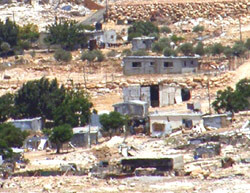The Electronic Intifada 17 July 2008

The village of ‘Arab a-Ramadin al-Janubi. (Ra’id Mukdi/B’Tselem)
The villagers in ‘Arab al-Ramadin al-Janubi have lived there, on land they purchased and recorded in the Land Registry Office, since the late 1950s. In 2002, with the construction of the separation barrier, which de facto annexed the Alfe Menashe settlement, the village became an enclave. On 5 June 2008, a delegation from the Civil Administration — a number of soldiers and an officer who introduced himself as the Civil Administration official in charge of Qalqiliya - demanded a meeting with village elders. The officer suggested that the villagers vacate the village and move to a site on the eastern side of the separation barrier. According to villagers, the officer said that, sooner or later, the residents would be made to leave, and if they moved now, the Civil Administration would assist them, by providing electricity and water, for example. The village elders refused to listen to the offer and left the meeting.
In the past, Israel stated officially that, “the possibility is being considered to offer the Bedouins living in ‘Arab a-Ramadin al-Janubi and ‘Arab Abu Farda to go and live on a site located on the other side of the fence.” However, in 2007, in the high court action referred to above, the state undertook and the judgment ordered, that the state ensure reasonable living conditions for the villagers.
Israel has done nothing to meet its undertaking and has even issued demolition orders regarding some structures in the village.
The villagers earn a living from raising sheep and goats, and the separation barrier blocks their access to grazing lands, cutting off their source of income. With their condition deteriorating, there is grave concern that Israel is interested in moving them, by denying them a way to make a living, or by expelling them forcibly.
There is a precedent. On 29 October 2007, Israel expelled the 200 residents of Khirbet Qasa, a village west of Hebron that was imprisoned between the Green Line and the barrier. The army then destroyed the village.
The failure of the state to carry out its undertaking to the high court further violates the residents’ human rights. The separation barrier was established inside the West Bank, in violation of international law. The villagers’ hardship results from Israel’s construction of the separation barrier, so Israel is obligated to find a solution for them where they live. The forcible transfer of protected persons in occupied territory is a grave breach of international law, for which the perpetrators — both those who carry out the transfer and those who gave the orders — are subject to criminal liability and prosecution before international tribunals.
The defense authorities are even forbidden to consider forcibly transferring the villagers of ‘Arab al-Ramadin al-Janubi. The authorities must find other ways to provide them with reasonable living conditions, as they promised to the high court, including access to their traditional grazing areas.
Background
The village ‘Arab al-Ramadin al-Janubi was established in the 1950s by Palestinian refugees who several years earlier were forced from their homes in al-‘Ouja, in the Beersheva area. The villagers purchased the land from residents of nearby Habla.
The village lies southeast of Qalqiliya. In the 1980s, the Alfe Menashe settlement was built about 1.5 kilometers southeast of the village. The village has sixty families, a total of 200 persons, who live in extremely harsh conditions. They live in improvised structures made of tin and sackcloth, are not hooked up to electricity, have no access road and no health services or educational facilities. Most of the residents gain a living from raising sheep and goats; others engage in trade or as hired workers.
The villagers used to graze their flocks on land on which the Alfe Menashe settlement was built and on land east of Qalqiliya, which lies north of the village. Following the establishment of Alfe Menashe, only the land near Qalqiliya remained available to them for grazing.
The separation barrier
The separation barrier in this area, constructed in 2002, winds like a finger eastward, deep into the West Bank to surround Alfe Menashe and place the settlement west (on the Israeli side) of the barrier. The barrier’s route detaches and isolates the village and four nearby Palestinian villages from their grazing land and from a number of Palestinian villages with which the residents had extensive ties and where they received vital services.
Not having access to their grazing land, the villagers bought fodder, but the high cost made them give up this alternative. As a result, residents estimate that 80 percent of the villagers have sold their flocks, losing their source of income. A few of them now work in temporary jobs as gardeners and in doing cleaning work at the Alfe Menashe settlement, while others live off the money they made from selling their flocks. About 10 percent of the workforce from the village work elsewhere in the West Bank and face difficulties daily in crossing the checkpoints.
On 29 August 2007, the High Court ordered the state to change the barrier’s route around the Alfe Menashe settlement, removing three villages — Ras al-Tira, Wadi al-Rasha, and M’arat al-Dab’a — from the enclave the route had created. The decision did not provide a solution for the hardships faced by the residents of al-Ramadin and Abu Farda, which remained west of the barrier. The judgment specified the state’s obligation “to act with the objective of providing reasonable living conditions for the residents [of the two villages remaining in the enclave].”
Related Links